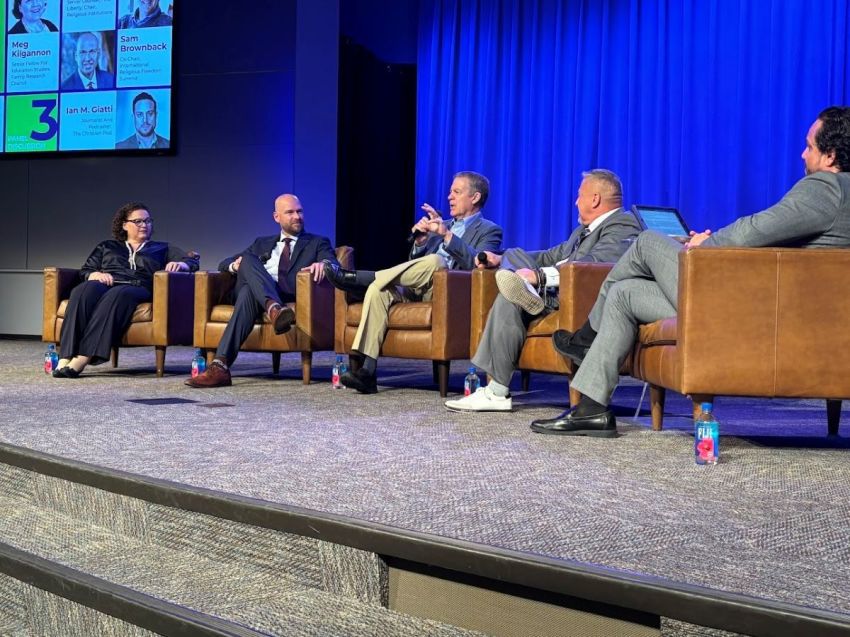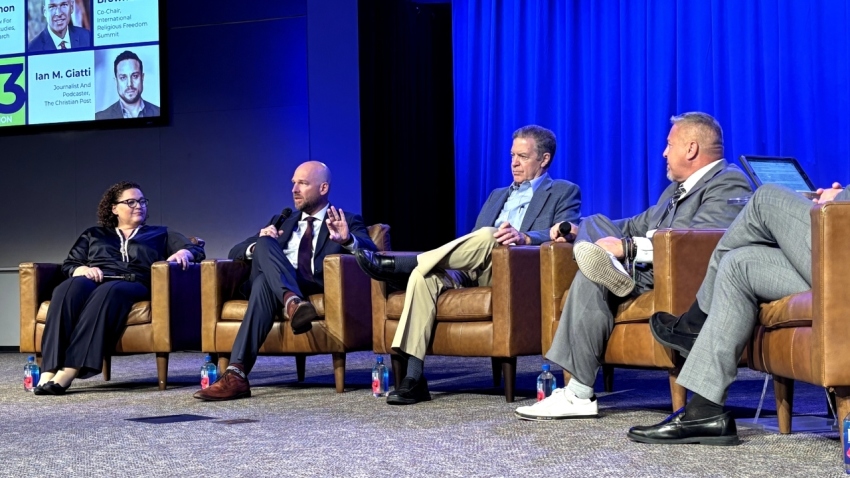'An effort to suffocate': Experts warn of emerging threats in America's religious freedom battle

Editors' note: This is part 14 of The Christian Post's year-long articles series "Politics in the Pews: Evangelical Christian engagement in elections from the Moral Majority to today." In this series, we will look at issues pertaining to election integrity and new ways of getting out the vote, including churches participating in ballot collection. We'll also look at issues Evangelicals say matter most to them ahead of the presidential election and the political engagement of diverse groups, politically and ethnically. Read other articles in the series by clicking here.
GRAPEVINE, Texas — Former U.S. Ambassador-at-Large for International Religious Freedom Sam Brownback and other experts warned earlier this week that Christians must continue to fight for religious freedom in American culture even if they are achieving major political or legal victories.
The panelists gathered Tuesday as an extension of The Christian Post's "Politics in the Pews" podcast and article series to discuss diminishing religious liberty in the United States and the growing threats to religious freedom, including the Equality Act and the politicization of the U.S. Supreme Court.
The panel, which was one of three moderated at Fellowship Church by Christian Post reporter and podcaster Ian M. Giatti, included insights from former GOP Kansas Gov. Brownback, First Liberty Senior Counsel Jeremy Dys, Family Research Council Senior Fellow Meg Kilgannon and Joseph Kennedy, the former football coach fired for praying on the field who won his case before the U.S. Supreme Court in 2022.
'You're going to have to fight'
Brownback, who resigned as Kansas governor in 2018 to serve as U.S. ambassador-at-large for international religious freedom under former President Donald Trump until 2021, emphasized the importance of standing up for religious freedom and the need for individuals to be proactive in defending their rights.
Even if Christians like Kennedy are victorious in court under the current 6-3 conservative makeup, Brownback suggested that American Christians are going to have to fight for their religious freedom if they hope to maintain it.
"The Supreme Court doesn't set the culture of the country; we do, it's the people," Brownback said. "But if you're not willing to go out and exercise and find it and push for it — really, the bigger issue is you're just not willing to stand up and fight a little bit, because you're going to have to fight a little bit to do this — it won't matter."
He spoke of a time when he asked Supreme Court Justice Samuel Alito if religious freedom will persist in the U.S., to which the Roman Catholic reportedly said, "You'll have it in the law, but I'm not sure you'll have it in the culture."
Brownback said some Christians are beginning to face financial persecution as major U.S. banks have allegedly started "de-banking" religious organizations such as his National Committee for Religious Freedom (NCRF).
NCRF, a multi-faith 501(c)4 political action nonprofit, made headlines in 2022 when it alleged that JPMorgan Chase shuttered its bank account without explanation after demanding a list of its donors, the candidates they support and potential political donations.
NCRF's situation is not unique, and Bank of America prompted a letter from 15 Republican state attorneys general earlier this year alleging the company "is responsible for some of the worst-known instances of debanking" while at the same time cooperating with the federal government to provide "innocuous" private information to paint some conservative customers as "potential domestic terrorists."
Brownback said he is personally aware of a woman who heads a crisis pregnancy center and was recently denied Directors and Officers (D&O) insurance because the insurance company told her they did not approve of what she was doing.
"It's de-insurance and de-platforming, de-banking, and it's this effort to suffocate," he said. "And we've got every right on our side. We've got the Free Exercise Clause, and now we've got a Supreme Court that's defined it and said, 'You have this right to do this.'"
"I don't care what other people think about it, you have a free constitutional right to exercise your faith, but we've got to fight for it," he added.
Resetting the standards
Kennedy, an 18-year Marine veteran and former assistant coach for the varsity football team at Bremerton High School in Washington state, faced suspension and eventual firing in 2015 for kneeling in prayer at the 50-yard line after games. His case reached the U.S. Supreme Court, which ruled in 2022 that his prayers were protected by the First Amendment.
The court ruled 6-3 in favor of Kennedy and upheld the constitutional right of public school employees to engage in brief, personal private prayer, which effectively overturned the 1971 Supreme Court decision in Lemon v. Kurtzman, which had established the three-prong "Lemon test."
The Lemon test permitted the government to be involved in religion only if it served a secular purpose, did not inhibit or advance religion and did not result in excessive entanglement of church and state.
Jeremy Dys, who serves as senior counsel at First Liberty Institute and represented Kennedy, explained the landmark nature of the Supreme Court ruling in Kennedy's case.

"It says that our religious speech is doubly protected, because what Lemon had done was to set up this, this fake battle between the two clauses in the Constitution governing religious expression — the Establishment Clause, which prevents the government from telling you what you should believe and how you should believe it — and the Free Exercise Clause, which guarantees your right to be able to express your religious beliefs."
Dys said Kennedy's case allowed the Supreme Court to decide that the Lemon test was a misreading of the U.S. Constitution and that the two clauses were intended to complement each other "to maximize your religious freedoms, to restrain the government from telling you what to believe and how to believe it, and to also give you the space to engage your freedom size of religion."
Dys said that Kennedy's case reset the standards back to the Constitution and "reminded everybody of the freedoms we once had in this country, that for four generations we have allowed to wither and die in the vine because the Supreme Court and other courts have said so."
"We won the case; we won you the freedom back," said Dys. "Go do something with it. I need you to go be a free people again."
Dys also warned that if the Left succeeds in its purported goal of politicizing the Supreme Court by expanding the number of judges or imposing term limits, victories like the one Kennedy achieved will become less likely.
"If we don't have fair umpires behind the plate, there's nothing I can do to get the game fair," he said.
Equality Act
Kilgannon, who serves as a senior fellow for education studies at the Christian conservative advocacy group Family Research Council, warned about the potential dangers posed to people of faith by the Equality Act championed by Democrats in Congress, which she noted is at odds with biblical values and has received the full-throated support of Vice President Kamala Harris.
The act would codify discrimination protections based on sexual orientation and gender identity into federal law.
"We see so often it's these questions surrounding human life and human sexuality, where our values as Christians come in direct contrast to what those kinds of proposals would entail and require us to say things that aren't true, to agree with things we don't believe in, and to promote those things and to endorse those things," she said.
"And we simply cannot do that as Christians. We can't do it for ourselves, but we also can't do it because it's not good for anybody, even the people who believe those things are true. And so we really must stand fast against those kinds of pressures."
During a recent "Politics in the Pews" podcast, Kilgannon said supporters of the Equality Act, such as Harris, are trying to use civil rights as a "skin suit" to enshrine sexuality and gender identity protections into law, which she warned would pose a threat to religious liberty.
'Strap on the brass knuckles'
The panelists emphasized the importance of using truth and legal action to combat the threats to religious liberty.
Dys noted that "there is a time and a place" for Christians "to be kind and gentle and good," but added that for some Christians, there is "a time to strap on the brass knuckles and punch back and take back what is rightfully yours."
"That is not in any way designed to foment violence," he added. "Do not read into that at all, but that is metaphorically the position we find ourselves in today."
Dys urged the audience to maintain the confidence of those who possess the truth, the Word of God and the protections of the U.S. Constitution.
"Take that confidence forward and move into the territory that you possess today," he said.
When Giatti asked the panel their advice for the average Christian to make their voices heard, Kennedy jumped in and noted that while he might not be able to provide an in-depth answer like his fellow panelists, he believes the answer is simple and starts with men spiritually leading their own families.
"It starts on your knees in prayer," he said, adding that "men need to feed their families and stand up and be men." He also urged them to get involved in their local school districts and make small decisions about which companies they will subsidize.
"Not everybody is called to fight up in everybody's face, but support the people who are on the front lines," he added. "Everybody can do that."
Jon Brown is a reporter for The Christian Post. Send news tips to jon.brown@christianpost.com



























